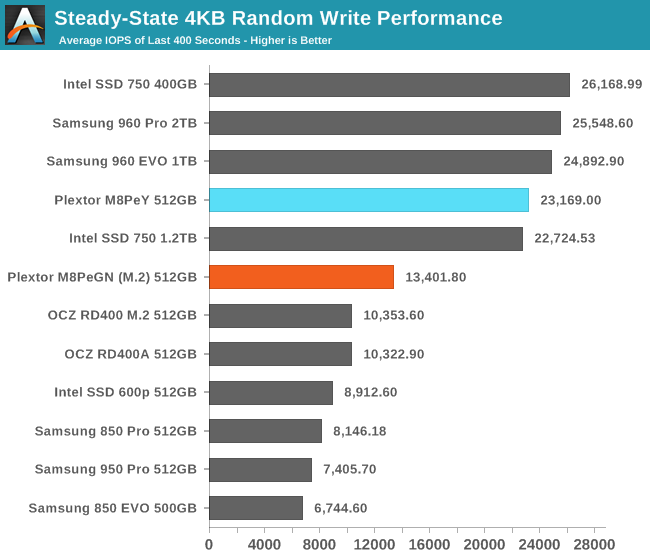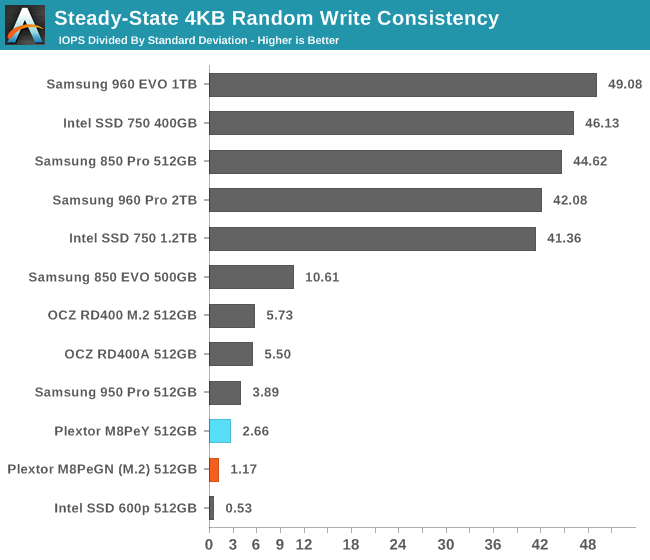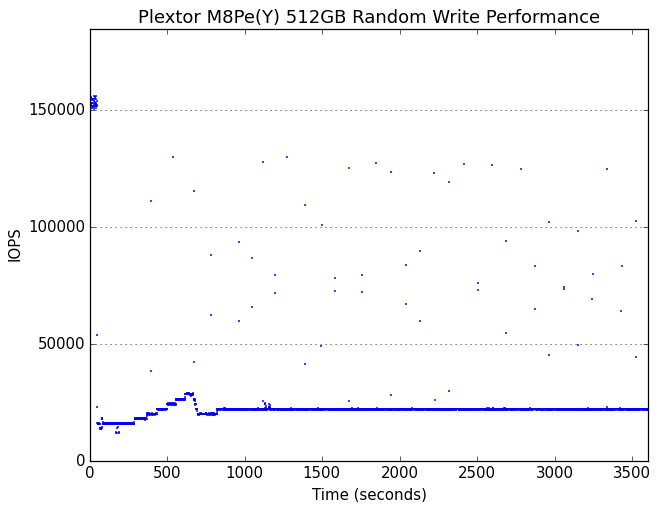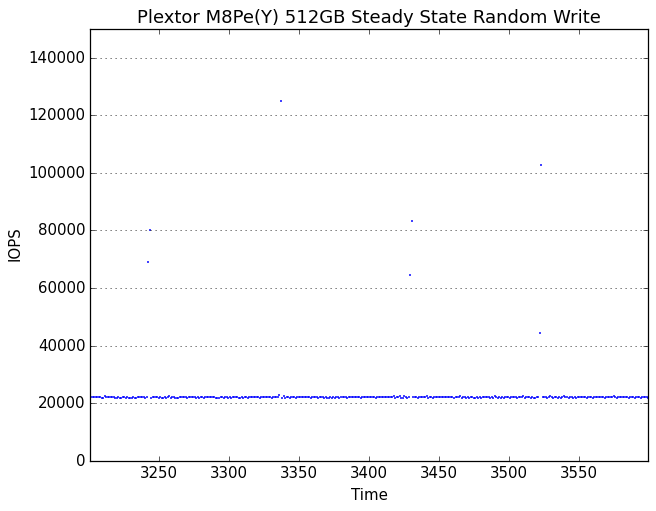The Plextor M8Pe (512GB) SSD Review
by Billy Tallis on December 14, 2016 9:00 AM ESTPerformance Consistency
Our performance consistency test explores the extent to which a drive can reliably sustain performance during a long-duration random write test. Specifications for consumer drives typically list peak performance numbers only attainable in ideal conditions. The performance in a worst-case scenario can be drastically different as over the course of a long test drives can run out of spare area, have to start performing garbage collection, and sometimes even reach power or thermal limits.
In addition to an overall decline in performance, a long test can show patterns in how performance varies on shorter timescales. Some drives will exhibit very little variance in performance from second to second, while others will show massive drops in performance during each garbage collection cycle but otherwise maintain good performance, and others show constantly wide variance. If a drive periodically slows to hard drive levels of performance, it may feel slow to use even if its overall average performance is very high.
To maximally stress the drive's controller and force it to perform garbage collection and wear leveling, this test conducts 4kB random writes with a queue depth of 32. The drive is filled before the start of the test, and the test duration is one hour. Any spare area will be exhausted early in the test and by the end of the hour even the largest drives with the most overprovisioning will have reached a steady state. We use the last 400 seconds of the test to score the drive both on steady-state average writes per second and on its performance divided by the standard deviation.

The heatsink makes a huge difference in the sustained random write performance of the M8Pe. With the heatsink, the M8Pe is competitive with the Intel 750 and the Samsung 960 Pro and EVO. Without the heatsink, the M8Pe is slower by almost 10k IOPS, but still above average for consumer SSDs, including some of the NVMe competition.

The M8Pe's consistency scores are quite low, indicating that it lacks the tight regulation of Samsung and Intel's best drives that have similar average performance.
 |
|||||||||
| Default | |||||||||
| 25% Over-Provisioning | |||||||||
The second by second performance plot reveals that the apparently low consistency is on the M8PeY due entirely to occasional outliers of extremely high performance; most of the time the M8PeY is operating at a very consistent ~22k IOPS, and none of the outliers fall below that level. The M8PeGN without a heatsink or heatspreader suffers from frequent periods of thermal throttling and slightly lower performance when not throttled. The lower performance also causes the M8PeGN to take slightly longer to reach steady state.
 |
|||||||||
| Default | |||||||||
| 25% Over-Provisioning | |||||||||
With a heatsink, the M8Pe's steady state hovers around 22k IOPS, but without the heatsink it alternates between 18k IOPS and a thermally throttled 2400 IOPS. Fortunately, it spends more time in the high-performance state than the low performance state, and there are still a few of the extreme outliers above 100k IOPS.
The M8Pe responds very well to extra overprovisioning. The variability is increased slightly, but the performance with the heatsink jumps to 90-100k IOPS sustained. Without a heatsink, the steady state only increases to 60-65k IOPS, but the drive spends much less time thermally throttled and the performance in that state increases to about 6800 IOPS. It's no surprise that the Marvell 88SS1093 controller has been a popular choice for enterprise M.2 PCIe SSDs.










64 Comments
View All Comments
The_Assimilator - Wednesday, December 14, 2016 - link
Conclusion page: the paragraph "The performance differences between the Plextor M8Pe and the Toshiba OCZ RD400..." is repeated. BRO DO YOU EVEN EDITOR?Billy Tallis - Wednesday, December 14, 2016 - link
I think the problem may have been too much editor. My browser was getting really laggy and unresponsive while I was finishing up the article and rearranging things.Threnx - Friday, December 16, 2016 - link
Whoa there are still readers here? hah, I was cleaning out my bookmarks and saw anandtech. You realize all the talent left ages ago right? This site is dead. They're just riding on the name now...cbrownx88 - Friday, December 16, 2016 - link
@Threnx - where do you go now since Anandtech is a shell of its former glory?TemjinGold - Wednesday, December 14, 2016 - link
So... it basically loses across the board to the EVO but they want to charge more for it?Billy Tallis - Wednesday, December 14, 2016 - link
Keep in mind that the 960 EVO results here are for the 1TB model, and that kind of capacity advantage usually brings some performance advantage, too. But yeah, once the 960 EVO is actually shipping in volume, a lot of prices will probably have to come down. Unless the 960 EVO price goes up.close - Wednesday, December 14, 2016 - link
Prices for Samsung SSDs are rising due to the NAND shortage. If Plextor manages to resist this trend they might do well. After all most current workloads don't need anywhere near that kind of level of performance so a slight performance disadvantage is tolerable as long as it's reflected in the price.BrokenCrayons - Wednesday, December 14, 2016 - link
I wasn't aware of a NAND shortage. Do you happen to know the cause?Samus - Wednesday, December 14, 2016 - link
It's simply a supply and demand issue. Other causes are manufacturing process adjustments and lower yield issues often associated with transitioning to new processes.However, the shortage isn't as dire as 'close' makes it seem. Drive prices aren't necessarily increasing because of the shortage, but they aren't falling as they should be with the density improvements associated with TLC and widespread adoption of 3D VNAND. Samsung drives are increasing in price because vendors have noticed sharper demand for them than other drive, and I'm sure you can guess why based on this article alone...I'm not a Samsung fan, but they are currently the most balanced SSD products on the consumer market.
BrokenCrayons - Wednesday, December 14, 2016 - link
Ah that makes sense. Thanks!